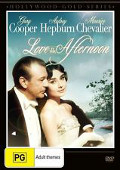
Directed by
Billy Wilder
130 minutes
Rated PG
Reviewed by
Bernard Hemingway

Love In The Afternoon
Rounding out a trio of 1950s movies in which Audrey Hepburn was paired up with much older men (to whit, Humphrey Bogart in Sabrina in 1954 and, also in 1957, Fred Astaire in Funny Face) comes this film adapted by director Billy Wilder with I. A. L. Diamond from a novel by Claude Anet.
Wilder had directed Sabrina and got similar material to work well enough but here he doesn’t. Partly the problem is with Gary Cooper as the older man. At best a wooden actor here with thinning hair and looking much older and stiffer than his 57 years (he died of cancer in 1961) he comes across as no-one’s idea of a Ritz-dwelling playboy millionaire and the idea that Hepburn’s young Parisienne would be swept off her feet by his charm and savoir faire simply doesn’t wash (only Cary Grant could pull off this kind of act).
The second issue is that whilst the aim was clearly to suggest a whirl of Paris-set romance in the Lubistch manner there is none of this on show and.the story is rather grubby (at least from a modern day perspective) as Cooper’s roué seduces the presumably teenage Ariane (Hepburn was actually 28 at the time but she specialized in these kinds of near-juvenile characters) and continues to bed her throughout the film in the manner of the film's title (not that we see any of that). There is a pass at endowing Ariane with feminine wiles which eventually snare Cooper’s Mr Flannagan in her seductive web but it is no more convincing than anything else in the film. And the idea that Ariane’s dear old Dad (Maurice Chevalier) would cheerily approve of the story's final outcome is anything but plausible. But this was Hollywood of the 1950s when, as Chevalier's opening narration indeed does, a Parisian setting was used to justify any kind of romantic fantasy/
As the devoted father Chevalier provides some much-need charm and as the film goes on (for an excessive 2 hours 10 minutes) it does have its moments with scenes such as a disconsolate Cooper being solaced by a quartet of gypsy musicians in a Turkish bath and Hepburn pulling out all stops on her gamine persona in a railway station farewell but overall the film is too formulaic in execution and dated in its values to hold much appeal.
FYI: Continuing the older man syndrome trend Hepburn was teamed with Cary Grant in Charade in 1963 and Rex Harrison in My Fair Lady (in which case it made sense) and William Holden in Paris When it Sizzles, both of which were released in 1964.
Want something different?





